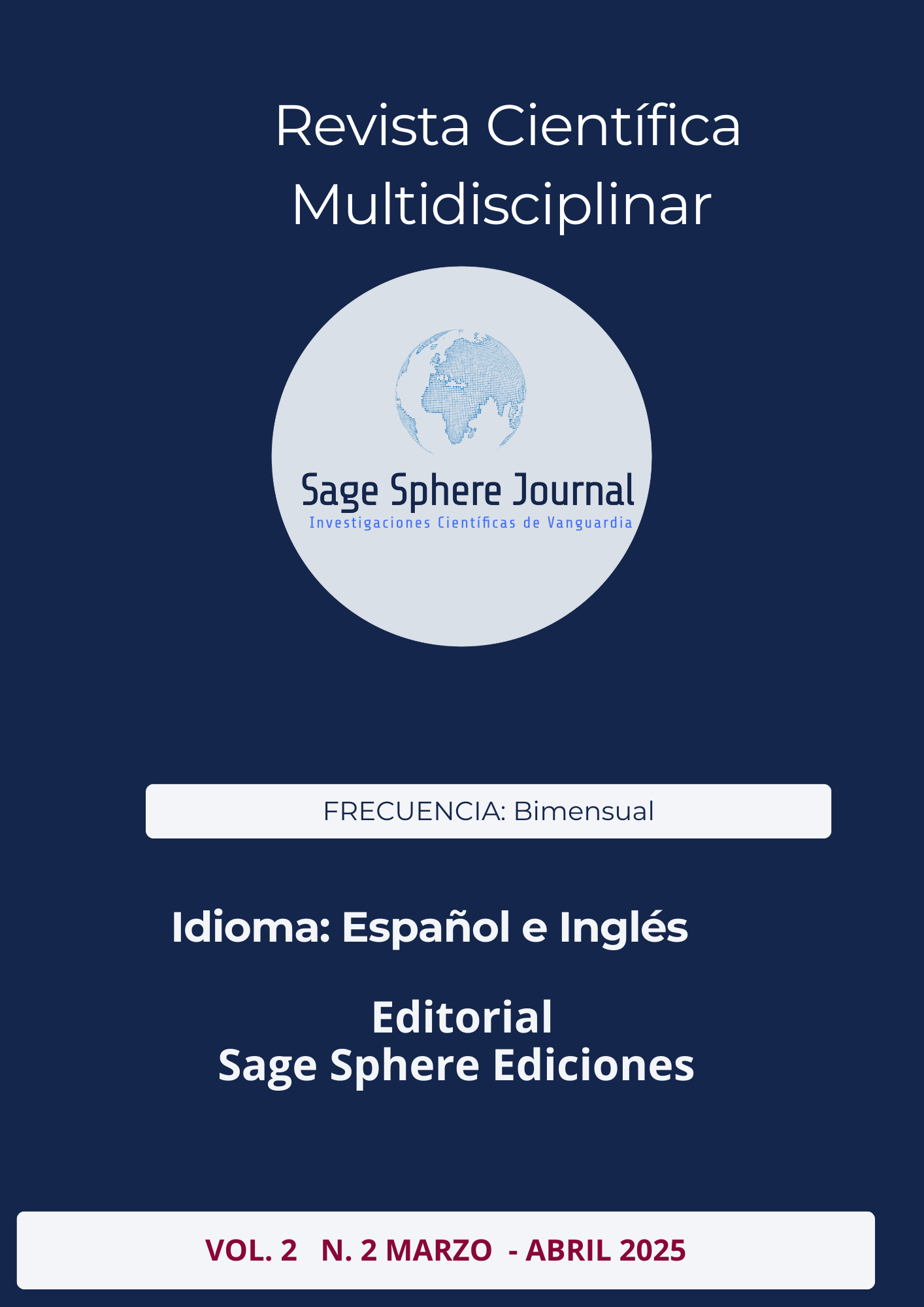Neurolinguistic processes and emotional regulation in the understanding of social and scientific thought
DOI:
https://doi.org/10.63688/b3z0q643Keywords:
social thinking, scientific thinking, neurolinguistic processes, emotional regulation, global educationAbstract
Social and scientific thinking represents a fundamental skill for the comprehensive development of students at all educational levels, especially in a world characterized by uncertainty, information overload, and the need for critical analysis of reality. This article presents a literature review focused on the analysis of fifteen studies conducted between 2020 and 2024 that address the influence of neurolinguistic processes and emotional regulation in strengthening social and scientific thinking in an educational context. The research is based on a qualitative and descriptive approach, which allows us to identify how the interaction between language, emotion, and thought improves students' cognitive, communicative, and socioemotional skills. The results show that the implementation of strategies based on neurolinguistic programming (NLP) and emotional management promotes the construction of deeper, more critical, and contextualized knowledge, both in the social and natural sciences. Furthermore, the importance of the teacher's role as an emotional and communicative mediator in the classroom is emphasized, as is the need for learning environments that foster empathy, reflection, and emotional self-regulation. The discussion suggests that social and scientific thinking cannot be developed independently of affective and linguistic aspects, and that transformative education must integrate these components to meet contemporary social demands. In conclusion, it is argued that strengthening social and scientific thinking requires a holistic view of the student, recognizing the importance of their emotional world and their language encoding and decoding processes as fundamental axes of knowledge construction.
References
Barría-Herrera, P., Améstica-Abarca, J. M., & Miranda-Jaña, C. (2021). Educación socioemocional: discutiendo su implementación en el contexto educativo chileno. Revista saberes educativos, (6), 59-75. Recuperado de:https://sabereseducativos.uchile.cl/index.php/RSED/article/view/60684
Bolaños, E. A. (2020). Educación socioemocional. Controversias y concurrencias Latinoamericanas, 11(20), 388-408. Recuperado de: https://www.redalyc.org/articulo.oa?id=588663787023
Cervantes López, V. (2022). Cultivar la diversidad e inclusión en la educación. Revista digital universitaria, 23(1). Recuperado de: https://biblat.unam.mx/es/revista/revista-digital-universitaria/articulo/cultivar-la-diversidad-e-inclusion-en-la-educacionCosta, A., & Faria, L. (2017). Educación social y emocional revisitada: perspectivas sobre la práctica en la escuela portuguesa. RIFOP: Revista interuniversitaria de formación del profesorado: continuación de la antigua Revista de Escuelas Normales, 31(88), 65-76. Recuperado de: https://dialnet.unirioja.es/servlet/articulo?codigo=5980956de León, T. M., de León Arellano, E., Vázquez, L. R., & Martínez, M. C. (2024). Programa de investigación sobre la alfabetización, la práctica docente y la educación socioemocional (PI-APDES). Una revisión bibliográfica. Revista Ra Ximhai, 20(1), 135-156. Recuperado de: https://doi.org/10.35197/rx.20.01.2024.06.
Tm de los Santos, J. (2020). Inclusión y Educación. Bases de y para una educación inclusiva. In Educación inclusiva: abriendo puertas al futuro (pp. 49-82). Editorial Dykinson. https://www.torrossa.com/en/resources/an/4689516#page=49
del Carmen Benítez-Hernández, M., & Ramírez, L. V. (2019). Las habilidades socioemocionales en la escuela secundaria mexicana: retos e incertidumbres. Revista electrónica en educación y pedagogía, 3(5), 129-144. https://doi.org/10.15658/rev.electron.educ.pedagog19.09030508
Díaz Barriga Arceo, F., & Barrón Tirado, M. C. (2022). Desafíos del currículo en tiempo de pandemia: innovación disruptiva y tecnologías para la inclusión y justicia social. Revista electrónica de investigación educativa, 24. https://doi.org/10.24320/redie.2022.24.e10.4500
Díaz, M. A. P. (2021). De la diversidad cultural a una educación transcultural. Revista Internacional de apoyo a la inclusión, logopedia, sociedad y multiculturalidad, 7(1), 82-91. https://doi.org/10.17561/riai.v7.n1.5
Díez Gutiérrez, E. J., & Muñiz-Cortijo, L.-M. . (2022). La educación social en la escuela: una revisión actualizada. Revista de Investigación Educativa, 40(2), 403–419. https://doi.org/10.6018/rie.454511
Ferreira, M., Reis-Jorge, J., Olcina Sempere, G., & Fernandes, R. (2023). El aprendizaje socioemocional en la Educación Primaria: una investigación sobre las concepciones y las prácticas de los maestros en el aula. Revista Colombiana de Educación, (87), 37-60. https://doi.org/10.17227/rce.num87-12704
Guevara Benitez, C. Y., Rugerio Tapia, J. P., Hermosillo García, Á. M., & Corona Guevara, L. A. (2020). Aprendizaje socioemocional en preescolar: fundamentos, revisión de investigaciones y propuestas. Revista electrónica de investigación educativa, 22. Recuperado de: https://www.scielo.org.mx/scielo.php?pid=S1607-40412020000100126&script=sci_arttext
Gutiérrez-Torres, A. M., & Buitrago-Velandia, S. J. (2019). Las habilidades socioemocionales en los docentes: herramientas de paz en la escuela. Praxis & Saber, 10(24), 167-192. https://doi.org/10.19053/22160159.v10.n25.2019.9819
Martínez-Usarralde, MJ, (2021). Inclusión educativa comparada en UNESCO y OCDE desde la cartografía social. Educación XX1 , 24 (1), 93-115.https://doi.org/10.5944/educXX1.26444
Núñez-Flores, M., & Llorent, V. J. (2022). La educación inclusiva y su relación con las competencias socioemocionales y morales del profesorado en la escuela. Aula abierta, 51(2), 171-180. https://doi.org/10.17811/rifie.51.2.2022.171-180
Orrego, T. M., Milicic, N., & Vásquez, P. S. (2020). Educación socioemocional: Descripción y evaluación de un programa de capacitación de profesores. Revista Iberoamericana de Evaluación Educativa, 13(1), 185-203. Recuperado de: https://dialnet.unirioja.es/servlet/articulo?codigo=7408494
Sánchez Agostini, C., Daura, F. T., & Laudadío, J. (2019). La comunidad escolar como medio para el desarrollo socio emocional de los alumnos. Un estudio de caso en la República Argentina. Estudios pedagógicos (Valdivia), 45(3), 31-49. Recuperado de: https://www.scielo.cl/scielo.php?pid=S0718-07052019000300031&script=sci_arttext&tlng=en
Soto, M. A. V., Moreno, W. T. B., & Rosales, L. Y. A. (2020). La educación fuera de la escuela en época de pandemia por Covid 19. Experiencias de alumnos y padres de familia. Revista electrónica sobre cuerpos académicos y grupos de investigación, 7(14), 111-134. Recuperado de: http://cagi.org.mx/index.php/CAGI/article/view/213
Varela, D. C., Losada, A. S., & Fernández, J. E. R. (2019). Aprendizaje-Servicio e inclusión en Educación Primaria: una revisión sistemática desde la Educación Física. Retos: nuevas tendencias en educación física, deporte y recreación, (36), 611-617. Recuperado de: https://dialnet.unirioja.es/servlet/articulo?codigo=7260959
Veytia Bucheli, M. G., & Cárdenas Mata, S. (2023). Habilidades blandas y la web 2.0 en la educación secundaria. Emerging trends in education (México, Villahermosa), 5(10), 58-67. https://doi.org/10.19136/etie.a5n10.5078
Downloads
Published
Issue
Section
License
Copyright (c) 2025 Sage Sphere International Journal

This work is licensed under a Creative Commons Attribution 4.0 International License.
Los artículos publicados en la revista se distribuyen bajo la licencia Creative Commons Atribución 4.0 Internacional (CC BY 4.0). Esta licencia permite a terceros descargar, copiar, distribuir, adaptar y reutilizar una obra, incluso con fines comerciales, siempre que se otorgue el crédito adecuado al autor original.





